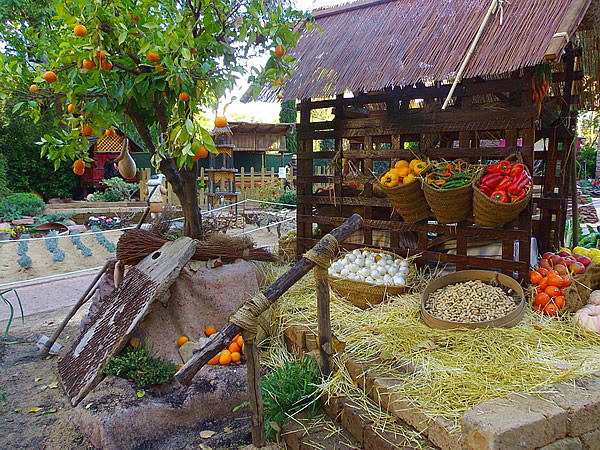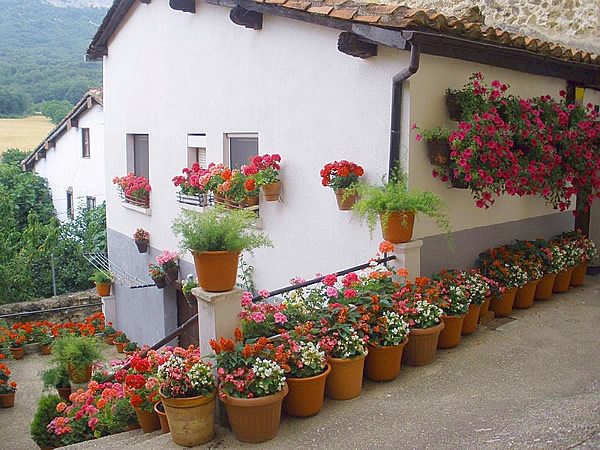Budget Travel in Spain
Inside Tips on Accommodations, Transportation and Eating Well
By Regina Winkle-Bryan
Resources updated 12/3/2023 by Transitions Abroad
 |
| One of many ways to travel on a budget in Spain is to buy from markets and eat at your vacation rental. |
(Note: At the time of this update, the Euro was equal to US$1.10, but always check conversion rates.)
I live in Barcelona, one of the largest and priciest cities in Spain, where the quantity of tourists is often overwhelming during peak seasons, such as summer. Here, a coffee goes for €2.50, a ride on the bus is about the same €2.50, produce is incredibly inexpensive, and entrance into any of the popular museums will run you at least €8.00. How about lunch? I might have the Menu del Dia or Daily Special for €12 if I get lucky, but otherwise I will spend up to €20-30 eating in a restaurant in Barcelona. Dinner is more, and the price depends heavily on how many bottles of Rioja are ordered. Don’t let $30 dinners keep you from visiting Spain. If you know where to look there are plenty of deals to be had across the Iberian Peninsula.
(Note: You can always check the current prices using the crowdsourced data for the cost of living in Barcelona on Numbeo.com, and cross-reference accommodation prices though the many global and local apartment and house rental agencies that list online.)
Sleep Cheaps in Spain
 |
| Stay at a vacation rental that looks similar to this one in Spain, pay less per night, and have access to more space and a kitchen. You can find rentals in cities and the countryside. |
After plane tickets, accommodations are the most expensive aspect of travel. Hotel prices are fairly steep across the board in Spain, so for budget sleeps, avoid anything that says “hotel.” Instead, look into Hostals, Pensiones, and Casas Rurales for comfortable stays that will not lay waste to your budget.
Hostal is not the same as hostel. Many times, Hostales in Spain are like B&B’s, usually family-run with shared bathrooms. Most often they are small, with 10 rooms or so, and offer a much more intimate experience than staying in an enormous Best Western. Pensiones are not much different and both go for about €45 to €80 a night. When looking into staying at both Pensiones and Hostales, make sure to pay attention to the star system: the more stars they have, generally the better they are. A 1-star pension may be a bit shabby. Also, as always, location is the key. Look for accommodations that are not on the city’s main plaza or strip, as these are always more expensive and usually noisy. Instead, look for rooms tucked into side-streets, and located deeper in the barrio.
Short-term apartment rentals, casas rurales, camping, and room renting are a few more solid budget choices. Many companies set up week-long apartment rentals in Spain, and if you are traveling with a family or in a small group, this is the way to go (about €70 a night and up). I almost always book a short-term apartment when I travel with friends in Spain because it enables us to cook breakfast in the apartment, or shop at the local markets and make hearty dinners together. This is an ideal way to save. Beware of renting from private parties due to the occasional misrepresentations. For peace of mind, it is often best to go with a well-known holiday rental agency, such as airbnb and homestay.com.
If you rent a car, a great way to explore many beautiful off-the-beaten-path places in Spain, you could stay in a casa rural. These are like B&B’s in the Spanish countryside and usually the family that runs the casa rural offers meals for an extra cost. Some are rustic while others are elegant, and the price varies as such, though you could estimate from €25 to €50 a night. I really love this option because it gets you way off the beaten tourist track and into the house of a local. Stay in a casa rural while touring the many olive groves of the south, the vineyards of the north, and the mountains along the Spanish-French border. Some casas rurales also rent out the entire house. This could be a fitting option if you are a large family or a group and want to stay in the countryside for a week or more, be comfortable in terms of space, and cook your own food from the cheap and tasty produce that you can gather at local markets on occasion (€500 to €1,000).
Finally, the cheapest ways to stay (apart from couchsurfing and youth hostels) are campgrounds or renting a room in a flat. Campgrounds in Spain are not like those in the United States. Growing up in Oregon, my idea of camping involves roughing it with days foregoing showers. In Spain, campgrounds are like mini-resorts, with swimming pools, stores, cafes (of course, one needs his morning espresso and croissant!), showers and restaurants. If you have a tent you will pay about €20-25 per person (if not less), plus another €5 to €10 for the car. You will need a car to camp (more on this below), but this can be a smart way to save. Many campgrounds also rent out cabins and bungalows fairly inexpensively (from €45 to €80 a night, sleeping up to five).
In Barcelona and Madrid especially, people rent out rooms in private homes by the day or week (usually they ask you to stay for more than one day). This is by far the cheapest way to go and depending on what sort of room it is, you could pay as little as €15 a night. Check craigslist, a local apartment rental agency, or sites likes airbnb.com and homestay.com which may have some lower-cost options. When looking for a room, try to find one that is in the center of the city and perhaps in a student or international flat, which are the safest choices.
Train Hopping is Not Necessary
It used to be that travelers bought a train card — often a Eurail pass — when arriving in Europe and so rode the rails from Paris to Seville. Many people still do this, but it is not the cheapest alternative anymore. In my 4+ years in Spain I have taken everything from ferries to horse-drawn carts, and believe that it pays to shop around. Depending on how much ground you are going to cover and how many people you are traveling with, renting a car can be cheaper than taking the train or bus. SIXT is my favorite car rental company in Spain. They sometimes offer deals for rentals over a week. Flying can also work out to be a bargain in the long run. With low-cost flights such as Iberia you can many times get a round-trip ticket for €100 (if not less). Of course, flying can also be more of a hassle, but for long trips from Barcelona to Granada, for example, it will save you a lot of time and cash.
Eat Your Heart Out in Spain (Without Going Broke)
Eating out adds up no matter where you are. If you have access to a kitchen at your chosen accommodation, find the local market in the morning and buy some fresh fish, delicious fresh vegetables, fruit, the many great versions of jamon serano and manchego, some great red table wines. Cook your lunch and eat like royalty for a fraction of the price at home.
When you go out in the south of Spain, every time you order a drink, they will bring you a snack or a tapa for free. Don’t count on this in Catalonia, where you will be expected to pay for everything that crosses your table.
To save money, skip the restaurants and eat in cafes. A deli-style lunch in a cafe will cost you no more than €6, while eating in a restaurant will run you double. In more expensive Barcelona, try to hit up the Kebab stands for a filling and delicious lunch. No, these kebab stands do not offer typical Spanish cuisine, but for €7 you will get a filling falafel or pork kebab and a drink. Take your kebab to go and eat it on the beach for a unique picnic in the sun.
The options to live well on little money while traveling in Spain are endless so long as you stay away from tourist traps and do just a bit of planning.
Regina Winkle-Bryan is a Barcelona-based freelance writer and photographer.
|
